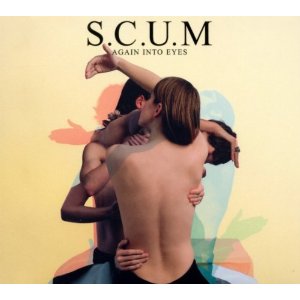Listening to S.C.U.M’s Again Into Eyes, it seems near to impossible to describe what this band have created without reference to other bands before them. The sonic palette is by turns Telescopes-esque shoegazer, post-Goth (showing just a hint of lace sleeve, pomp and a strategically placed pair of Aviators), Low-period Bowie and Dog Man Star-era Suede. Nick Cave-styled lead singer/lyricist Thomas Cohen seems to veer from Bowie/Pete Murphy laconic drawl to almost uncanny Brett Anderson, depending on the amount of reverb applied (and it’s applied copiously and often). Even in timbre those motorik drums recall mid-period Joy Division and everything Martin Hannett ever did for them. And that’s not to mention Primary Colours breathing down this album’s neck like a nervous uncle (or, indeed, big brother; they’re related), shades of the-most-used-keyboard-sound-in-witch house, and These New Puritans’ percussion and aesthetic. The album is so drenched with sonic references it’s difficult to give it its own measure – its merits are already the merits of others.
This album falls victim to the more-is-more syndrome. It douses otherwise stronger and more distinctive songs in far more reverb and echo than it needs. While that gives tracks like ‘Whitechapel’ and ‘Cast Into Seasons’ a tangible emotional quality – that melancholic, evocative spirit often associated with the best of the psychedelic end of shoey – it also carbon dates the album and swamps some of its more visionary ideas, the strong songwriting remaining muffled within. Even the repetitive synth and bass lines seem to lack the required hook.
Yet if these songs are good enough they will stand time’s trials, with or without reverb or Pete Murphy. Songs like ‘Cast Into Seasons’ and ‘Amber Hands’, for example, and ‘Summon The Sound’ are strong, really strong – anchoring basslines, almost doppler synths which seem to create phase shifts within their own reverb loops. The atmosphere is aquatic, of the sea, a sense of dreaming and attempting to define the emotional within the digital.
Should S.C.U.M not have held on for a year, and allowed it to be less perfect, less hyped, less the subject of trash magazines, less trading on image? Have S.C.U.M shot themselves in the winklepicker by trying to surf the Shoreditch Darkwave a little too knowingly, and two years too late? For a band whose main attraction is their isolationism, their overexposure for all the wrong reasons may be difficult to overcome, but if they survive that the ideas here suggest exciting things lay ahead for – and from – S.C.U.M.


